|
|
|
Sort Order |
|
|
|
Items / Page
|
|
|
|
|
|
|
| Srl | Item |
| 1 |
ID:
158320
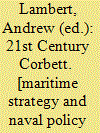

|
|
|
|
|
| Publication |
Maryland, Naval Institute Press, 2017.
|
| Description |
153p.pbk
|
| Standard Number |
9781682471685
|
|
|
|
|
|
|
|
|
|
|
|
Copies: C:1/I:0,R:0,Q:0
Circulation
| Accession# | Call# | Current Location | Status | Policy | Location |
| 059369 | 359.03/LAM 059369 | Main | On Shelf | General | |
|
|
|
|
| 2 |
ID:
170556
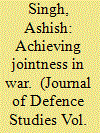

|
|
|
|
|
| Summary/Abstract |
The creation of the Chief of Defence Staff (CDS) is a start to defence reforms. This should improve jointmanship in peacetime; however, joint wartime performance needs further reform and improvement. We face three problems: (i) historical lack of unified warfighting strategy formulation at the apex military level; (ii) the unclear division of responsibility and resources between service Chiefs and Commanders-in-Chief (C-in-Cs); and (iii) the differing natures of command and control between the three services, which manifest as differences in structural organisations. Treating India as one unified theatre can reduce these problems. It will allow the creation of a joint structure for strategy formulation at the apex level, resulting in one national strategy to guide subordinate strategy. Also, it will give ownership of all warfighting assets to a single commander who can centralise or decentralise at will, and yet not preclude formation of smaller military entities with collocated headquarters (HQ) of subordinate service formations. Examples from history support the arguments.
|
|
|
|
|
|
|
|
|
|
|
|
|
|
|
|
| 3 |
ID:
107149
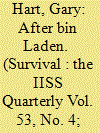

|
|
|
|
|
| Publication |
2011.
|
| Summary/Abstract |
The Cold War ended 20 years ago. NATO has yet to define a twenty-first- century mission. New allies and new rivals are emerging. There are new security threats that do not lend themselves to military response and that cannot be addressed either by old alliances or by the United States alone, and the nature of warfare and the character of conflict themselves are changing. The United States' national predisposition, however, has been to rely on traditional institutions and policies and to use them to address unfolding history on its own timetable.
|
|
|
|
|
|
|
|
|
|
|
|
|
|
|
|
| 4 |
ID:
132864
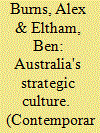

|
|
|
|
|
| Publication |
2014.
|
| Summary/Abstract |
This article draws on fourth generation strategic culture debates to show the gap between the rhetoric of Australian defence and the more modest reality. Our analysis shows that these limits derive from tensions between national strategic culture and organizational strategic subcultures. There are serious debates in the nation regarding the preferred course of the Australian military and security policy. This article frames these debates by examining the 'keepers' of Australia's national strategic culture, the existence of several competing strategic subcultures, and the importance of norm entrepreneurs in changing defence and national security thinking. Strategic subcultures foster compartmentalization, constraints, and bureaucratic silos that narrow national conceptions of security threats and opportunities, and impinge on the formation of coherent foreign and defence policy in relation to the Asia-Pacific region. This analysis shows that a distinct national strategic culture and organizational strategic subcultures endure beyond individual governments, placing potential limits on Australia's interface with other Asia-Pacific strategic cultures in the future.
|
|
|
|
|
|
|
|
|
|
|
|
|
|
|
|
| 5 |
ID:
148471


|
|
|
|
|
| Summary/Abstract |
The rise of big data has brought with it enormous possibilities, for better or worse. In China, the government has been enthusiastically preparing for the coming of the era of big data. This article examines how the authoritarian regime in China has been employing big data to improve its governance and to move towards a ‘Big Brother 2.0’ model. The regime has combined cooptation with coercive control to exploit digital technology, in order to maximize its utility and thus maintain authoritarian rule. Moreover, existing debates on digital technology largely focus on the changing power structures between state and society, but neglect power structures within regimes and their implications for authoritarianism. This article argues that the use of massive digital data may backfire against the authoritarian regime as it may change the power structure within the state. That is to say, efforts to embrace big data may also undermine the authoritarian rule. A more accurate understanding of the Chinese authoritarian regime's resilience and vulnerability in the information age will help us grasp the essence of China's rise as a fragile global power.
|
|
|
|
|
|
|
|
|
|
|
|
|
|
|
|
| 6 |
ID:
133853
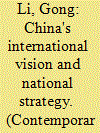

|
|
|
|
|
| Publication |
2014.
|
| Summary/Abstract |
The global order was set in place following the end of the Second World War by a consortium of western countries headed by the U. S. since then, major western countries have strived to maintain their long dominance in global politics and economics. With the rise of nationalist movements, former colonies gained their independence, and many developing countries joined the UN in recent years the economies of the emerging powers have grow rapidly and they have also joined WTO.
|
|
|
|
|
|
|
|
|
|
|
|
|
|
|
|
| 7 |
ID:
131437
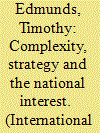

|
|
|
|
|
| Publication |
2014.
|
| Summary/Abstract |
British strategy-making has been subject to a sustained critique in recent years, from parliamentarians, retired members of the armed forces and scholars of strategic studies. This article examines the nature of this critique and the evolving character of strategic practice in Britain. It argues that the criticisms of British strategymaking are often misplaced, for two main reasons. First, many base their critique on a reductionist notion of unitary 'national interest' that fails to capture systemic patterns of complexity and contestation in the wider security environment and in Britain. Second, they underestimate or ignore the extent to which the UK strategic community is itself innovating in response to these themes, particularly since the 2010 Strategic Defence and Security Review. This is not to argue that considerable challenges do not remain for strategy-making in Britain. Most notably, these include: how to translate strategic innovation in departments and elsewhere into a coherent national strategic agenda; how to do this while maintaining institutional coordination and a shared sense of strategic purpose across government (and beyond); how to sustain and consolidate institutional expertise and experience in a rapidly changing civil service and at a time of continuing public austerity; and how to articulate and legitimate security policy decisions among a general public that is both disengaged from elite strategic discourse and sceptical of the efficacy of military force. Even so, the article concludes by arguing that it is possible to see the outline of an emergent and distinctive theory of action in contemporary British strategic practice, characterized by principles of adaptivity, anticipation, self-organisation and nascent cross-governmentalism.
|
|
|
|
|
|
|
|
|
|
|
|
|
|
|
|
| 8 |
ID:
185466
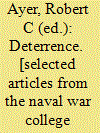

|
|
|
|
|
| Publication |
Newport, Naval war college press, 2021.
|
| Description |
189p.pbk
|
| Series |
Newport Paper no.; 46
|
| Standard Number |
9781935352785
|
|
|
|
|
|
|
|
|
|
|
|
Copies: C:1/I:0,R:0,Q:0
Circulation
| Accession# | Call# | Current Location | Status | Policy | Location |
| 060189 | 355.0217/AYE 060189 | Main | On Shelf | General | |
|
|
|
|
| 9 |
ID:
130668
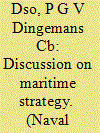

|
|
|
| 10 |
ID:
103296
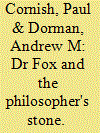

|
|
|
|
|
| Publication |
2011.
|
| Summary/Abstract |
The history of British defence reviews has been one of repeated disappointment: a cycle in which policy failure is followed by a period of inertia, giving way to an attempt at a new policy framework which is then misimplemented by the defence leadership. Each failed defence review therefore sows the seeds of its successor. With this in mind, in 2010 the new coalition government embarked upon an altogether more ambitious exercise: a strategy review comprising a National Security Strategy and a Strategic Defence and Security Review. This article suggests, nevertheless, not only that the 2010 strategy review looks likely to follow past performance, but also that it is coming unstuck at an unprecedented rate. This is a pity since the 2010 review had much to commend it, not least the adoption of a risk-based approach to security and defence policy-making. What is the explanation for this outcome? Is it that the British have, as some have suggested, lost the ability to 'do strategy', if ever they had it? The authors offer a more nuanced understanding of the policy process and argue that the coalition government in fact has a very clear and deliberate strategy-that of national economic recovery. Yet the coalition government cannot allow national defence and security to fail. The authors conclude with an assessment of the options open to the defence leadership as they seek to address the failing 2010 strategy review and suggest a variety of indicators which will demonstrate the intent and seriousness of the political, official and military leadership of the Ministry of Defence.
|
|
|
|
|
|
|
|
|
|
|
|
|
|
|
|
| 11 |
ID:
123887


|
|
|
|
|
| Publication |
2013.
|
| Summary/Abstract |
The next Strategic Defence and Security Review (SDSR) will be held in 2015. With unfinished business from its 2010 predecessor, and with no sign that UK national strategy is about to escape the grip of austerity, the 2015 SDSR is set to be more complex and contentious than the government might have hoped.
There is a possibility that the review will, yet again, see the three armed services struggle against each other to secure the largest slice of a diminishing cake. The review might also be captured by a fruitless discussion of 'grand strategy'. SDSR 2015 must avoid both of these distractions.
There are four principal concerns arising from SDSR 2010: the feasibility of the Future Force 2020 plan, various capability gaps that must be managed, inconsistencies in the national strategic planning framework, and unresolved concerns about the relationship between society, armed forces and government in the UK.
In response to these concerns, the authors argue for a risk-sharing approach to the SDSR, embracing the widest conceivable range of stakeholders in national strategy: the armed services, government departments and agencies, industry, civil society, and allies and partners.
In UK military circles, inter-service cooperation is known as 'jointery' and is denoted by a certain shade of purple. The effect of austerity is to constrain national strategy, just as the international security environment makes ever more demands upon it. In these circumstances, strategic options must be generated by joint collaboration, denoted by as many shades of purple as appropriate.
|
|
|
|
|
|
|
|
|
|
|
|
|
|
|
|
| 12 |
ID:
127011
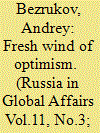

|
|
|
|
|
| Publication |
2013.
|
| Summary/Abstract |
The international system is currently in the midst of a profound crisis. Each cycle of "creative destruction" of the old world order changes "the rules of the game." The new international system will be shaped by new factors of success and new behaviors of its actors. The faster a country adapts to the new rules, the more successful it will be in the coming 10 to 20 years. The speed of the adaptation to the new global environment will greatly depend on the capacity of governments to understand where the world is going and to build a sound competitive strategy.
The Atlantic Council, in its recent report "Envisioning 2030: U.S. Strategy for a Post-Western Word," based on the scenarios published by the National Intelligence Council, believes that the United Stated has a second chance to win the dominant position in the world. Remarkably, Russia gets almost no mention in the report, it is virtually written off as an influential player of the future.
Does Russia have a chance in the new global system? What are its challenges? What should Russia do to succeed? We believe that the success of Russia will depend on its ability to rethink its place in the world and devise a new strategy that would differ from the one it used in era of the Euro-Atlantic great-power rivalry.
|
|
|
|
|
|
|
|
|
|
|
|
|
|
|
|
| 13 |
ID:
054480
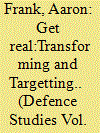

|
|
|
| 14 |
ID:
096580


|
|
|
|
|
| Publication |
2010.
|
| Summary/Abstract |
With the end of the Cold War, the subsequent global war on terror, the global economic recession, and wars in Afghanistan and Iraq, one would think that the United States would have formulated a grand strategy for dealing with these problems. This, however, is not the case. This article advances a grand strategy of "restrainment," as a guiding concept for our approach to international politics. It builds from the principle that U.S. policy must seek to restrain-individually and collectively-those forces, ideas, and movements in international politics that create instability, crises, and war.
|
|
|
|
|
|
|
|
|
|
|
|
|
|
|
|
| 15 |
ID:
126785
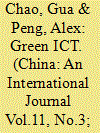

|
|
|
|
|
| Publication |
2013.
|
| Summary/Abstract |
Under the national strategy of a "let informatisation drive industrialisation, and let industrialisation promote informatisation", China's electronic information industry has achieved continuous and dramatic development during the last three decades. It has now become one of the most essential pillar industries for China's national economy. However, severe pollution issues and environmental challenges emerge at different stages throughout the lifecycle of Information and Communication Technology (ICT) products, from their design, development, and manufacturing to use and to disposal. Evidence shows that much effort has been put to increase industrial profit margin, improve indigenous innovation, and overcome the negative effects of the 2008 financial crisis on China's electronic information industry. Nevertheless, environmental issues have traditionally received less attention from industrial manufacturers and users of ICT products (e.g. CEOs, managers and employees of companies, and individual citizens). China is still in its infant stage in building up a green electronic information industry. This paper discusses and highlights the importance and impacts of current environmental challenges faced by the electronic information industry, as well as to propose the implementation of Green ICT as a key strategy to ensure environmental-friendly use of ICT equipments and thus maintain sustainable development of this industry in the long term.
|
|
|
|
|
|
|
|
|
|
|
|
|
|
|
|
| 16 |
ID:
110275


|
|
|
|
|
| Publication |
2012.
|
| Summary/Abstract |
Humanitarian Assistance and Disaster Relief (HADR) operations have attracted the attention of the global community in recent years. Building capabilities, interoperability and a conceptual framework for participation in these operations is gaining increasing urgency among Indian policymakers. The Indian armed forces have a wide experience of disaster relief operations both at home and abroad, where they have been the core of relief operations. Due to its sub-continental size, geographical location and its vulnerability to disasters, India has kept its forces ready to render assistance at short notice. In the six decades since independence, India has experienced a number of natural and man-made disasters such as floods, earthquakes, famines, industrial accidents etc. At the same time, India has partnered the global community in providing relief in affected regions. As India moves to occupy an important position in the global community, it is in the process of bolstering its capabilities to match the rising expectations. That India would play an important role
|
|
|
|
|
|
|
|
|
|
|
|
|
|
|
|
| 17 |
ID:
155557
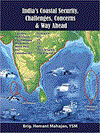

|
|
|
|
|
| Publication |
Pune, Madhavi Prakashan, 2017.
|
| Description |
xvi, 336p.pbk
|
|
|
|
|
|
|
|
|
|
|
|
Copies: C:1/I:0,R:0,Q:0
Circulation
| Accession# | Call# | Current Location | Status | Policy | Location |
| 059213 | 359.54/MAH 059213 | Main | On Shelf | General | |
|
|
|
|
| 18 |
ID:
137712


|
|
|
|
|
| Summary/Abstract |
Surprisingly, the emergent and increasingly popular phenomenon of nation branding has received only scant attention from International Relations scholars. While most analyses account for the phenomenon by emphasizing the perceived material benefits to be derived from establishing a positive national brand, this article provides an alternative perspective. It argues that nation-branding processes need to be understood as responding to the need of states and state leaders to enhance both their citizens and the nation's sense of ontological security and (self)-esteem. Moreover, this quest for self-esteem and ontological security is unfolding in the context of broader realignments occasioned by the advent of late modernity. While nation branding represents an understandable response to these developments, the article questions the strategy's overall efficacy by highlighting its implications for how national subjectivity is constituted, its notable disciplining elements and its potentially undemocratic implications.
|
|
|
|
|
|
|
|
|
|
|
|
|
|
|
|
| 19 |
ID:
144040
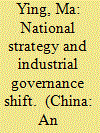

|
|
|
|
|
| Summary/Abstract |
During the past decades, there has been a shift in the governance structure of the power transmission and distribution (PTD) industry from a market-oriented scheme to vertical integration. Such a shift in industrial governance was driven by the change in national strategy from “market in exchange for technology” to “independent innovation”. Under this new policy paradigm, the ultra-high voltage (UHV) transmission technology was perceived as strategically important for the country. The State Grid Corporation of China (SGCC), whose control over the industry was initially reduced in the reform, leveraged the paradigm shift in the state policy and strengthened its position in the industry by redefining the main and auxiliary services. The State Grid successfully brought back all UHV industry-related services, such as power design, equipment manufacturing, power grid construction and capital operation, into its main business category, which could be exempted from market competition according to state regulation. Eventually, the State Grid was able to establish strong vertical integration in the whole sector.
|
|
|
|
|
|
|
|
|
|
|
|
|
|
|
|
| 20 |
ID:
138012
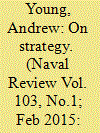

|
|
|
|
|
| Summary/Abstract |
In the first of a series of four articles, the author examines some of the pitfalls and issues facing modern strategists, whether military or civilian. He begins with an exploration of strategy through its evolution, definitions, and some of the tensions in the politico-military continuum. He uncovers causes of friction in the remarkable trinity of passion, chance and reason, and identifies sources of evidence to aid us in our education.
|
|
|
|
|
|
|
|
|
|
|
|
|
|
|
|
|
|
|
|
|